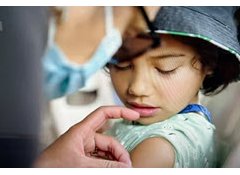News
COVID fatigue and mistrust behind low child immunisation rates
27 Sep 22

A special survey conducted for The Hui television programme reveals some of the reasons why Māori are not getting their children vaccinated against diseases which could cause them great harm.
The Hui reported and discussed very low immunisation rates for some tamariki Māori - with one expert guest saying an outbreak of measles, like that in the Philippines, "is just one flight away".
There are 13 vacines for children aged up until age 17.
The Hui reported latest offical figures showing 67.1% of all children aged six months had had the vaccines they were scheduled to receive by that age. However, among Māori in this age group the vaccination rate was 45.9% and in Counties-Manukau, the centre of a pre-COVID measles outbreak, it was 34.4%.
Survey key findings:

Key findings from Horizon's nationwide online survey of 529 Māori respondents, representing the Māori adult population, are:
- Nearly one on five tamariki Māori are not fully immunised against 13 diseases, some of which cause serious illness and death.
- 82% are immunised. Of these
- 62% had all their immunisations on time. However,
- 4% of caregivers do not intend for their tamariki to be fully immunised or immunised at all.
The research found immunisation rates for tamariki Māori are lower than for the child population overall.
- This in spite of an overwhelming majority of Māori (92%) believing immunisations are important to protect tamariki Māori (60% extremely important). There is also a strong belief overall that many tamariki will fall ill due to low immunisation rates: 76% said it was likely (23% of this group saying definitely likely).

However,
- Households with younger tamariki do not consider immunisations as important. 51% of carers with tamariki aged 2-4 years say immunisations are extremely important and 54% of carers with tamariki up to 2 years old think they are extremely important.
Potential to immunise:
The survey indicates there is potential to achieve up to 94% full or partial immunisation among tamariki Māori.
- 12% of carers with tamariki say they haven’t had all their immunisations but will get round to either full or further immunisations.
- 53% of tamariki under 2 have been immunised on time and 46% of tamariki aged 2-4 years. Almost a third of 2-4 year olds have been immunised but not on time.
- Nearly a fifth of under 2 year olds and 2-4 year olds still need to be fully immunised.
Why caregivers are not having tamariki immunised:

Tiredness over the COVID-19 pandemic, concerns over side effects and distrust of advice are key drivers behind not immunising.
- When asked why tamariki were not fully immunised, 28% were worried about side effects. The Covid-19 pandemic has also had an effect with 27% saying it has put them off thinking about vaccines and 19% are worn out by it and can’t be bothered.
- 20% also do not trust vaccines and 19% do not trust the Ministry of Health advice on child immunisations.
A guest on the panel, Juliet Rumball-Smith, Health NZ's Director of Intelligence, said some of the research findings were encouraging. The high number who believed immunisations were important was "a fantastic base to go from" and "it's important we hear the information we've been given".

Panellists discussed how COVID-19, and the need to focus on vaccinating against it, while access to schools and medical clinics and services had been disrupted, were also behind the lower immunisation rates. But they were now beginning to grow - and the "track back through clinics" to meet health needs was being re-established.
They discussed options to reach whanau with people and at places they trusted - and applying all the infrastructure which had been used to successfully respond to COVID-19, like mobile clinics, events at marae and "vaxathons" being available now to immunise tamariki.
The cost of an outbreak of, say, measles, with half of its victims during the last outbreak in Auckland being admitted to hospital, was far more than an effort to effectively immunised children against diseases.
Further information:
Newshub has reported on The Hui programme.
Further in-depth results of this survey are available to Horizon Research clients.
Please contact:
Graeme Colman, Principal, Horizon Research
Email: gcolman@horizonresearch.co.nz
Telephone: +64 21 858 576.
HorizonPoll Online Survey system
and website developed by BEWEB
Copyright © 2010. HorizonPoll incorporating ShapeNZ - Listening to New Zealand


